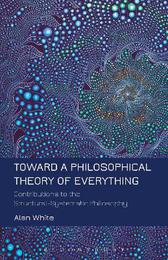
|
Toward a Philosophical Theory of Everything: Contributions to the Structural-Systematic Philosophy
Paperback / softback
Main Details
| Title |
Toward a Philosophical Theory of Everything: Contributions to the Structural-Systematic Philosophy
|
| Authors and Contributors |
By (author) Professor Alan White
|
| Physical Properties |
| Format:Paperback / softback | | Pages:208 | | Dimensions(mm): Height 216,Width 140 |
|
| Category/Genre | Western philosophy from c 1900 to now
Philosophy - metaphysics and ontology |
|---|
| ISBN/Barcode |
9781623567187
|
| Classifications | Dewey:110 |
|---|
| Audience | | Professional & Vocational | |
|---|
|
Publishing Details |
| Publisher |
Bloomsbury Publishing Plc
|
| Imprint |
Bloomsbury Academic USA
|
| Publication Date |
27 March 2014 |
| Publication Country |
United States
|
Description
Moral values are real-we don't just make them up. Beauty is in the world-it's not just in the eye of the beholder. You are free-what you do is not always determined by electrochemical processes in your brain. And the universe we live in is God's creation. These are radical claims. But they are widely rejected in contemporary philosophy because they are almost always considered in relative isolation from one another. This book shows that when they are considered in conjunction, they gain mutual support. And it shows this both clearly and concisely. But its systematic approach to philosophy also reveals that various philosophical positions currently widely accepted and defended can appear plausible and perhaps even compelling only when they are considered in relative isolation-as they, too, almost always are. When the issues on which these positions are taken are considered in conjunction, problems come into view and the alternative positions defended in this book emerge as superior. Toward a Philosophical Theory of Everything is a ground-breaking work that shows the importance of systematic thinking, while also defending positions, on central philosophical issues, that are widely rejected in contemporary philosophy.
Author Biography
Alan White is the Mark Hopkins Professor of Philosophy at Williams College, USA.
ReviewsTo read this book is to feel oneself liberated from some of philosophy's oldest dogmas. Rejecting the view that systematic philosophy has to provide unchangeable truth, White undertakes a "theory of everything" which aspires instead to be the best available. In so doing he connects many dots that have long needed connecting, from the ontology of propositions to the purpose of religion. He does this speedily, yet without haste; clearly, yet without simplification. Whether or not one agrees with all details of his presentation, Toward a Philosophical Theory of Everything clearly points philosophy into a new and different future. -- John McCumber, Distinguished Professor, Department of Germanic Languages, UCLA, USA While the term 'theory of everything' is usually associated with contemporary physics, this book shows that such a theory properly pertains to philosophy. Indeed, the author convincingly argues that no theory presented by contemporary physics could really be a 'theory of everything' since contemporary physics has as its subject matter a restricted universe of discourse. Conversely, philosophy is a strictly theoretical endeavor whose subject matter is the unrestricted universe of discourse. And since the unrestricted universe of discourse includes everything, a philosophical theory whose subject matter is the unrestricted universe of discourse is a philosophical theory of everything. The range of philosophical topics the author addresses in this book is impressive; topics which are both of great philosophical importance and of deep human concern. -- Carlo Cellucci, Professor Emeritus of Philosophy, La Sapienza University of Rome, Italy Though painstaking in his attention to salient details and sharply focused on the intricacies of meaning, evidence, and argumentation, there is nothing at all scholastic or self-enclosed about the manner in which the author explores topics of fundamental philosophical significance and, more often than not, of deep human import. One of the strengths of this work (and there are many) is that this "theory" exposes and indeed explodes the pretentions of scientism. A first-rate contribution to the speculative tradition of philosophical thought. -- Vincent M. Colapietro, Liberal Arts Research Professor of Philosophy, Pennsylvania State University, USA Alan White has provided an accessible and yet rigorous and compelling introduction to structural-systematic philosophy. Structural-systematic philosophy takes full account of key insights from analytic philosophy, continental philosophy, and modern science, but because it does not limit itself to any particular mode of discourse, it can convincingly claim to be a "philosophical theory of everything." Clearly presented and tightly argued, this book is a must-read for anyone interested in systematic philosophy. -- Michael Baur, Associate Professor of Philosophy, Fordham University, USA TAPTOE opens philosophical inquiry to 'everything' by not restricting the universe of discourse in the quest for comprehensive knowledge. The critiques of philosophical views on truth, knowledge, freedom, beauty, being, and God are carefully argued, and the discussions engage with current literature... This is a critically important work for all those deeply interested in philosophical issues and their significance for basic human concerns. Useful index. Summing Up: Highly recommended. -- H. C. Byerly, emeritus, University of Arizona * CHOICE * On the one hand, TAPTOE can be read as a primer offering a 'clear and concise introduction' to the structural systemic philosophy (SSP). On the other hand, it supplements and advances themes mentioned in Puntel's texts that require further elaboration and concretization, such as human freedom and beauty. In both aspects White presents to the reader a lucid, compelling theory of being that overcomes the shortcomings of other available frameworks. -- Nathan R. Strunk, McGill University * Philosophy in Review XXXIV (2014), 6 *
|